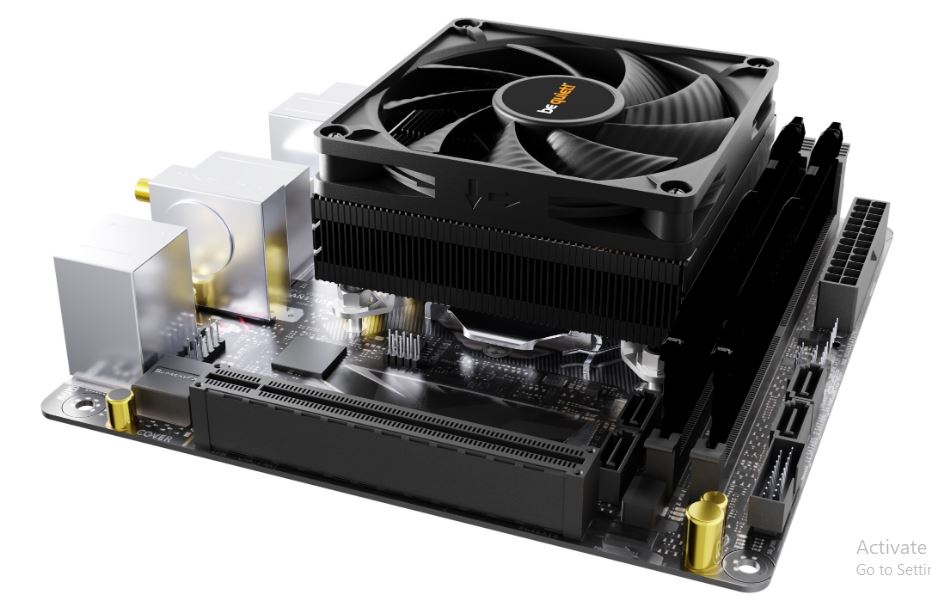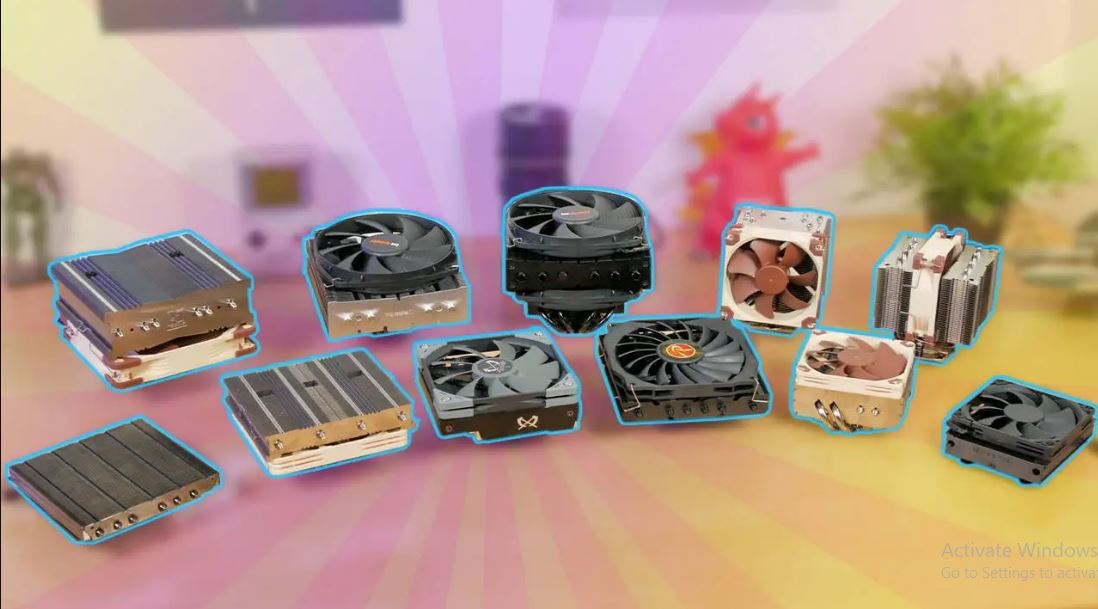Imagine a cooler, sleeker, and more compact computer that fits very seamlessly into your compact PC. Not only is it sleek, but it is also efficient at keeping your CPU temperatures low. The CPU is a very critical component for good processing performance. It is in the quest for the perfect CPU that this topic comes into play. What are the best low-profile CPU cooler?
Some of the best low-profile CPU coolers include the Noctua NH-L9i and NH-L9a. Be quiet! Shadow Rock LP, Cryorig C7, Cooler Master GeminII M4. There are other brands that work well. The best low-profile CPU cooler should not only have great form, but it should also have a great function.
These low-profile marvels are designed for those who demand the utmost from their system. So, join us on a journey into the world of low-profile CPU coolers, where we will explore the best options. Keep reading to determine the best low-profile CPU coolers.
What Is A Low Profile CPU Cooler?
A low-profile CPU cooler is a type of cooling solution designed for computer processors (CPUs) that offers effective heat dissipation while being compact in size. These coolers are particularly useful in scenarios where space inside the computer case is limited, such as in small form factor (SFF) PC cases or home theatre PC (HTPC) builds.
Low-profile coolers are typically shorter in height compared to standard tower-style coolers. This design allows them to fit into cases with limited vertical clearance. This feature ensures they don’t interfere with other components like RAM modules or graphics cards.
While low-profile coolers are smaller but still designed to dissipate CPU-generated heat. They often feature heat pipes, aluminium or copper heatsinks, and fans to ensure that the CPU remains at a safe temperature during operation.
Many low-profile CPU coolers prioritise quiet operation. They come with fans designed to run silently or at low noise levels, making them suitable for HTPCs or quiet computing environments. They are usually designed to be compatible with specific CPU socket types (e.g., Intel LGA 115x, AMD AM4). Ensure that the cooler you choose is compatible with your CPU socket.
When selecting a low-profile cooler, ensuring it fits within your computer case is essential. Check the clearance available in your case for CPU coolers to avoid any compatibility issues.
Low-profile CPU coolers are popular choices for compact PC builds, including Mini-ITX systems, slim desktops, and media center PCs. They offer a balance between effective cooling and space-saving design, making them ideal for situations where a full-sized tower cooler would not be practical or compatible.

Best Low Profile CPU Cooler
There are a lot of low-profile CPU coolers, and they come in different sizes and have various performance levels. So, here are some of the best low-profile CPU coolers and their features:
-
Noctua NH-L9i/NH-L9a
The Noctua NH-L9i (for Intel CPUs) and NH-L9a (for AMD CPUs) are among the top choices in low-profile CPU cooling. They feature a compact design with a height of only 37mm, making them ideal for small form factor (SFF) and HTPC builds.
These coolers use a single 92mm fan and offer excellent cooling performance while maintaining quiet operation. Noctua is well-known for its high-quality components and exceptional cooling capabilities.
-
Be quiet! Shadow Rock LP
Be quiet! Shadow Rock LP is another excellent low-profile cooler designed for quiet and efficient cooling. It has a low profile of 75mm, making it suitable for compact cases.
It has a 120mm fan, and aluminium fins provide good cooling performance while remaining silent. Its compact design ensures compatibility with most motherboard configurations.
-
Cryorig C7
The Cryorig C7 is a compact and affordable low-profile cooler that works well for both Intel and AMD processors. It features a height of 47mm and uses a 92mm PWM fan. The C7 offers decent cooling performance and is suitable for small form-factor builds. It’s often praised for its ease of installation and compatibility.
-
Noctua NH-L12S
If you need slightly better cooling performance while still maintaining a low-profile design, the Noctua NH-L12S is an excellent choice. It offers a maximum height of 70mm with the fan installed, which is still quite compact.
The cooler comes with two fan options, allowing you to customise its cooling performance based on your needs. Noctua’s quality and silent operation make it a reliable choice.
-
Scythe Big Shuriken 3
The Scythe Big Shuriken 3 is a low-profile cooler that offers a balance between cooling performance and compactness. It features a height of 69mm, a fan, and a large 120mm fan for efficient cooling.
The design incorporates heat pipes and a nickel-plated copper base for effective heat dissipation. It’s compatible with various CPU sockets and is well-regarded for its performance in small form-factor cases.
When selecting a low-profile CPU cooler, consider your specific case dimensions, CPU socket type, and thermal requirements. These coolers have unique features that make them suitable for different scenarios, from compact HTPC setups to small gaming rigs.
What Are The Disadvantages Of Low-Profile CPU Cooler?
Low-profile CPU coolers offer a small form factor and compact build but also have disadvantages. These disadvantages include the following:
-
Reduced Cooling Performance
Low-profile coolers are inherently limited in size due to their compact design. This limitation means that they might not provide the same level of cooling performance as larger tower-style CPU coolers.
If you have a high-end CPU with a high TDP (Thermal Design Power), a low-profile cooler might struggle to keep temperatures in check, potentially leading to thermal throttling.
-
Limited Overclocking Potential
Due to their reduced cooling capacity, low-profile coolers are not well-suited for heavy overclocking. Overclocking typically generates more heat, and a low-profile cooler may not be able to handle the increased thermal load efficiently.
-
Compatibility Issues
Low-profile coolers can be more challenging to install in some cases. Their compact size might lead to clearance issues with other components, such as tall RAM modules or motherboard heatsinks. It’s crucial to check for compatibility before purchasing one to ensure it fits inside your case and doesn’t obstruct other components.
-
Noisy Operation At High Rpm
Low-profile coolers may need to run their fans at higher RPMs to maintain efficient cooling, which can result in increased noise levels. While some models are designed for quiet operation, others may become noticeably loud under heavy workloads.
-
Price Premium
High-quality, low-profile coolers from reputable brands can be relatively expensive compared to stock CPU coolers that come bundled with processors. You might need to invest a bit more in a good, low-profile cooler.
-
Limited Aesthetic Options
Due to their compact designs, low-profile coolers often have a simple and utilitarian appearance. If aesthetics are a significant concern for your build, you may find that there are fewer options available for customization or RGB lighting compared to larger coolers.
Low-profile CPU coolers are excellent for specific use cases where space is limited, but they may not offer the same level of cooling performance or overclocking potential as larger coolers.
It’s essential to consider your build requirements and the specific cooler’s specifications. It has to meet your needs without causing any compatibility or thermal issues.
Read: CPU GPU compatibility

Things To Consider When Getting A Low-Profile Cpu Cooler
When selecting a low-profile CPU cooler for your computer build, several important factors must be considered to ensure compatibility, performance, and overall satisfaction. Here are the key things to keep in mind when getting a low-profile CPU cooler:
- Ensure that you have case compatibility. Your low-profile CPU cooler should be compatible with your computer case. Measure the available clearance between the CPU socket, side panel, or any obstructive components. Most cooler manufacturers provide cooler height specifications for this purpose.
- Your CPU Socket should be compatible with your power supply type. Check if the cooler is compatible with your CPU socket type (e.g., Intel LGA 115x, AMD AM4). Low-profile coolers are often designed for specific socket types, so verify compatibility before purchasing.
- Check your cooler Height. Low-profile coolers come in various heights. Ensure the cooler’s height fits within the case and leaves enough clearance for other components, such as RAM modules, motherboard heatsinks, or graphics cards.
- Consider your cooling Performance. Assess your CPU’s thermal requirements. If you have a high-end CPU or plan to do overclocking, you’ll need a low-profile cooler that adequately dissipates heat. Look for coolers with larger heatsinks and more substantial fans for better cooling performance.
- Check the cooler TDP Rating. Thermal Design Power (TDP) is a measure of a CPU’s heat output. Choose a low-profile cooler with a TDP rating equal to or higher than your CPU’s TDP to ensure it can handle the heat generated.
- Consider the Fan Size and RPM. Larger fans typically move more air at lower RPMs, resulting in quieter operation. Look for coolers with PWM (Pulse Width Modulation) fans for automatic speed control based on CPU temperature.
- Check the Noise Level. If noise is a concern, research the cooler’s noise levels in decibels (dB) at different fan speeds. Some low-profile coolers are designed for silent or near-silent operation.
- Pay attention to the Heat Pipes and Base Material. Copper heat pipes and a copper or nickel-plated base tend to provide better heat transfer.
- Consider the ease of installation, especially in compact cases with limited space. Some coolers have complex mounting mechanisms, while others are straightforward to install.
- Low-profile coolers can vary significantly in price. Determine your budget and find a cooler that balances cost and performance for your needs.
- Check the Brand and Warranty. Reputable cooler manufacturers often provide better quality and customer support. Check user reviews and the manufacturer’s warranty policy.
- While aesthetics are a personal preference, some low-profile coolers come with unique designs or RGB lighting options. Choose a cooler that aligns with your build’s visual style if aesthetics matter to you.
By carefully considering these factors, you can select the best low-profile CPU cooler for your specific use case, ensuring that it fits within your case, cools your CPU effectively, and operates at an acceptable noise level.
Frequently Asked Questions
Will A Low-Profile Cpu Cooler Work For Gaming And Overclocking?
It depends on the specific cooler and your CPU. Some low-profile coolers can handle gaming and light overclocking for mid-range CPUs, but high-end gaming and heavy overclocking may require larger coolers for better thermal performance.
How Can I Determine If A Low-Profile Cooler Will Fit In My Case?
Measure the available clearance between your case’s CPU socket and side panel. Compare this measurement to the cooler’s height specification. Ensure there is enough space for the cooler without obstructing other components.
Are Low-Profile Cpu Coolers Less Efficient Than Taller Tower Coolers?
Generally, yes. Low-profile coolers are designed for compact builds and may not offer the same cooling performance as larger tower-style coolers. They prioritize size and compatibility over maximum cooling capacity.
Conclusion
As technology advances, they tend to become smaller. The first CPUs to exist were almost as large as a room, but these days, CPUs are now so compact and small that they require an even more compact CPU cooler. This size is why there are a lot of low-profile CPU coolers on the market.
While choosing the best low-profile CPU cooler, you have to consider a lot of factors, like your budget, PC case space, temperature, and component compatibility. This article has really explored the world of low-profile CPU coolers. If you are here, you now know what to look for.
